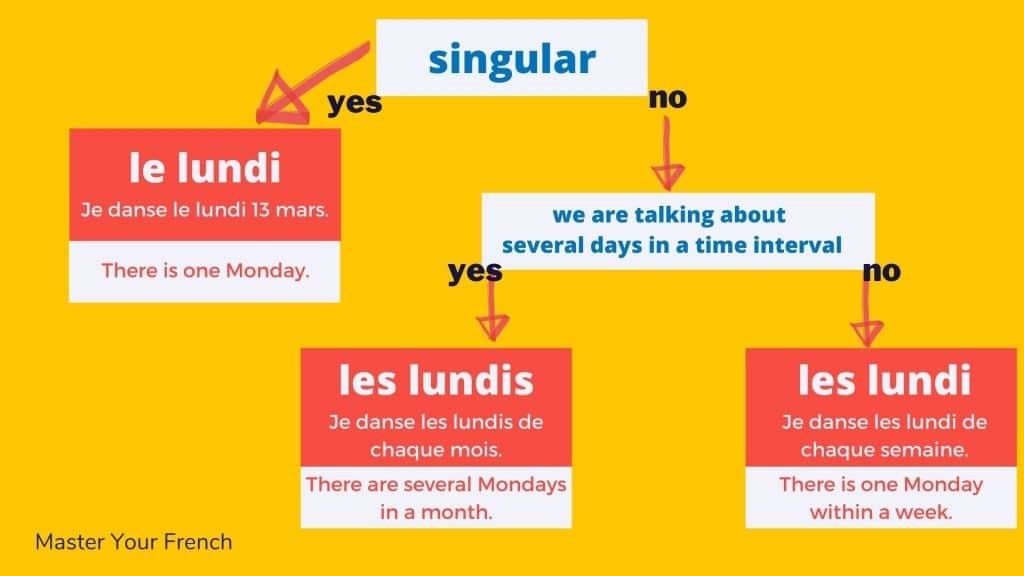All about the French days of the week in plural
Updated: 5 May, 2021 by Mylene in French Grammar ▪

Writing errors are a central concern for many French language learners. Despite being one of the first words when learning French, writing the days of the week in plural without an error can be tricky for many learners.
Which form is correct “les lundis” or “les lundi”? Have you considered when to add an s to samedi? If so, let’s check the French grammar rules to help you write the plural of the days of the week in French without any error.
In this article you’ll learn:
- The gender of the days of the week
- The 7 days of the week in French
- Invariable or agreement?
- Plural: When talking about several days
- Plural: When talking about a single day
- The agreement with matin, soir and après-midi
How to write the days of the week?
The French days of the week start with a lowercase letter, rather than being capitalized. However and as always, you must put a capital letter at the beginning of the sentence:
- Je vais à la patinoire mardi. I’m going to the rink on Tuesday (the word mardi is not capitalized).
- Mardi il va pleuvoir. Tuesday it will rain (Mardi is at the beginning of the sentence so you have to capitalize).
The days of the week are masculine. Therefore, we must use a masculine determiner (le, un):
- Le rendez-vous est prévu un jeudi. The meeting is scheduled for a Thursday.
- Nous fêtons son anniversaire le samedi 13 novembre. We celebrate his birthday on Saturday November 13th.
- Je reviens de congés le vendredi. I come back from vacation on Friday.
What are the 7 days of the week in French?
Saying the days of the week in French is easy. Here’s the list to learn the French 7 days of the week:
- Lundi: Monday
- Mardi: Tuesday
- Mercredi: Wednesday
- Jeudi: Thursday
- Vendredi: Friday
- Samedi: Saturday
- Dimanche: Sunday
The days of the week: invariable or agreement?
In French, there are many rules of agreement that you should know. In some cases, using a French grammar checker can be useful but in some cases disambiguating the context can be a daunting and challenging task.
Depending on the case, it is quite correct to write les lundis (with an -s) and les lundi (without -s). Let’s learn the rules that apply to the plural of the days of the week as well as some examples.
The agreement of the days of the week
When talking about several days
An -s should be added to indicate the plural only when the turn of the sentence implies that the word refers to several days, and not to a single day. In this case, the letter -s is not pronounced.
Let’s take some examples:
- L’assemblée se réunit trois mardis par mois. The assembly meets three Tuesdays a month: we add a -s because there are several Tuesdays.
- Tous les lundis, ils accompagnent leur enfant à l’école. Every Monday, they accompany their child to school: in this case, we also add an -s because it is recurring, there are several Mondays.
- Les commerces sont fermés plusieurs dimanches de suite. The shops are closed several Sundays in a row.
- Mon grand-père m’emmène à la pêche les mercredis et les samedis. My grandfather takes me fishing on Wednesdays and Saturdays.
You can also use the plural to avoid repetitions:
- Les réunions auront lieu le mardi 10 septembre et le mardi 13 octobre. Meetings will take place on Tuesday September 10 and Tuesday October 13.
To avoid repetition, you can simply say:
- Les réunions auront lieu les mardis 10 septembre et 13 octobre. Meetings will take place on Tuesdays September 10 and October 13.
Another example:
- Elle s’entraine le mardi et le jeudi de chaque semaine. She trains on Tuesday and Thursday of each week.
This sentence is equivalent to the following sentence:
- Elle s’entraine les mardi et jeudi de chaque semaine. She practices Tuesday and Thursday of each week (you’ll notice that in this case there are no -s at the end of the words Tuesday and Thursday, we’ll see why below).
When talking about a single day
When the day of the week is followed by an interval indication such as a week, month, year, then count the number of days within this time frame to know whether or not to add an -s.
Example:
- Le magasin sera fermé les lundi et mardi de la semaine prochaine. The store will be closed on Monday and Tuesday of next week.
We are referring to several days (there are two days: Monday and Tuesday). But there is only one Monday and only one Tuesday in a week. So there are no -s at the end of Monday and Tuesday.
You can also write:
- Le magasin sera fermé lundi et mardi la semaine prochaine. The store will be closed Monday and Tuesday next week.
This sentence has the same meaning and you don’t have to think about whether to add an -s or not.
Let’s take another example:
- Les réunions auront lieu les premier et troisième jeudis du mois. Meetings will take place on the first and third Thursday of the month.
There are two Thursdays in the month (the first and the third), so add an -s at the end. On the other hand, the first (premier) and third (troisième) remain in the singular because there is only a first Thursday and a third Thursday in the month.
We can use the singular to convey the same idea.
- Le samedi, je vais toujours à la piscine. On Saturdays I always go to the pool (this is a habit).
- Depuis des années, j’aime aller boire un café chez ma mère le mercredi. For years, I’ve enjoyed going to my mom’s house for coffee on Wednesdays.
- Le bureau de poste ferme chaque semaine le vendredi à 17 heures. The post office closes every week on Friday at 5 p.m.
To sum up: plural vs. singular form

Plural with matin, soir, après-midi
Placed after the days of the week, the words morning, afternoon, and evening are considered adverbs and do not agree with the preceding word, the day of the week in this case.
We must understand “in the morning”, “in the evening”, etc.
Example:
- Elle travaille les lundis soir She works Monday evenings (the word evening is considered an adverb, so it is invariable, do not add an -s).
- Je vais à la boulangerie les dimanches matin. I go to the bakery on Sunday mornings.
- Mes enfants vont à la garderie les jeudis après-midi. My children go to daycare on Thursday afternoons.
- Le bureau de poste est ouverte les jeudis et vendredis midi. The post office is open Thursdays and Fridays at noon.

Improve your grammar skills
Hope you have a better understanding of when to add an -s at the end of a day of the week.
Master You French is here to help you improve your level of French! So follow us and become a member!
To be informed of the latest news, I invite you to follow us on social networks. You can subscribe to the Instagram account @masteryourfrench, Twitter @myourfrench, and YouTube.

